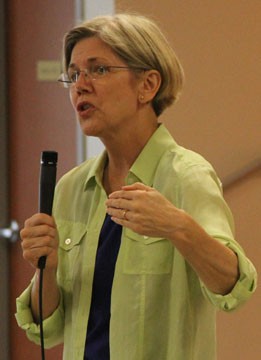Will Brown-Warren Deliver Bipartisan Promises?
Tuesday, July 17, 2012

Talking the Talk
Senator Brown has received numerous Democrats’ endorsements including Rick Caraviello, a Medford city councilor; former Democratic District Attorney of Bristol County; and Gloucester politicians, former Democratic State Representative Anthony Verga and Boston Democratic Mayor Ray Flynn. However, one political expert says these votes aren’t a sure sign of any across the aisle action. Worcester's own City Council member and former Mayor Konnie Lukes has endorsed Brown.
“The endorsements Brown received from Democrats have been minor, from those who have tended to endorse Republicans in the past,” said Mark Miller, Clark University professor of Political Science and Director of the Law and Society Program, doubts either candidate. “On most measures, he’s a very reliable conservative, except on a few high profile votes where he voted with the Democratic majority, but day to day he’s regular Republican.”
Given these endorsements and Brown’s being named the second most bipartisan member of the Senate in 2011, one could argue that his votes and support speak for themselves, but Miller says it’s not promising.
“If you look at his Americans for Democratic Action scores, the surrogate for ideology – a moderate usually scores 40-60. He scores in the low 20s,” Miller said, adding that the Washington Post reported that Brown votes with Republicans over 70 percent of the time.
Warren, addressing Teamsters Local 170 last weekend.
“I don’t believe either of these candidates would be. Scott Brown is a reliable Republican vote on almost all issues. Elizabeth Warren would be a reliable Democrat vote on almost all issues,” said the Clark professor. “If they get a six-year term, they have no incentive to act in a bipartisan manner. Both would be reliable votes for their parties after they get a six-year term.”
Unfortunately for the candidates, despite their talk, many are still doubtful of both sides.
Necessary to Move Forward
Political commentators say that now is a crucial time for bipartisanship with so much stagnation and pressing issues facing the Senate. The US Congress has become increasingly polarized, something that many say much change moving forward.
“We’re going to need it to address the budget challenges,” said Darrell West Vice President and Director of Governance Studies at the Brookings Institute. “Nothing will pass without support from the other side. It’s vital for political leaders to learn how to work with the other side to get things done.”
Miller agreed, saying that today’s Congress is much different than it was 10 or 30 years ago. He doesn’t see either candidate bringing any break in polarization.
“This is probably one of the most polarized congresses we’ve seen in recent history. There is very little bipartisan action in the current US Senate,” he said. “One needs 60 votes to fight a filibuster, in order to get anything done. Bipartisanship is crucial.”

Records and Voting History

While newcomer Elizabeth Warren does not have a voting history to stand up to, she has a history of financial work she says makes her a better candidate for working across the aisle.
When asked if she would show bipartisanship if elected, she said, “I have already done that. Go back and look at my record. When I went to Washington to try to bring some accountability to financial bailout, I was part of a bipartisan panel. “Democrats and Republicans worked together on some very difficult issues.”
Brad Wyatt, local small business owner, and organizer of liberty movement across the area is siding with Brown on this issue, saying that Warren’s funding speaks for itself.
“I think Scott Brown protects a lot more of the principles that America was founded on than his competitor. I think she’s more ideologically oriented, and he’s looking for solutions to help and small business owners,” Wyatt said. “From what I’ve read, a lot of her funding has been from left-leaning organizations. I think it would be hard for her to reach back to the center.”
The Brown campaign says that Warren too committeed to her party: “As the second-most bipartisan Senator in the country, Scott Brown has a proven record of working across the aisle to get things done for the people of Massachusetts. Professor Warren is a partisan rock-thrower, and is unable to name one area where she disagrees with her party," said the campaign's spokesperson Alleigh Marre. "We need more bridge-builders in Washington – we can’t afford more divisive ideologues like Professor Warren.”
The spokesperson cited this video as evidence that Warren was dodging an answer as to where her allegiance lies.
Despite this, Warren says that her background is solid.
“At the end of the day, this is how I see it: America’s working families have been hammered, whether they’re Democrats, Republicans. It doesn’t matter,” she said. “I will work with anyone who’s willing to strengthen America’s working class families. I don’t care about parties.”
While Warren says she doesn’t care about parties, her accusations toward Republicans have spoken otherwise on recent issues.

Warren’s Words

In past months, Warren has called Republicans out on a number of issues, accusing the party of acting against the best interest of voters.
In her recent work to support the DISCLOSE bill, she said, “Unfortunately, Scott Brown and Republicans in the Senate have blocked this common sense measure. It’s time for them to stop protecting their influential friends by helping them hide their influence from the public.”
She’s also discussed their measures to cut the country’s investment in the future as well as their battle on healthcare:
“With the Affordable Care Act just being rectified by the Supreme Court and the immediate response by Scott Brown, Mitt Romney and all of the Republicans is they want to fight about this for three more years,” Warren said. “We’re talking to people about what the new Affordable Care Act really provides. The Republicans want to take that away.”
Jennifer Duffy, political expert at Washington's The Cook Political Report, says that Brown has shown to be more bipartisan in the past. She says his claims are more provable.
“The proof comes in the form of not only local endorsements, but his legislative record – the number of bills that he has been able to pass and the number of bills in which he has been the principle co-sponsor with Democrats,” she said. “Warren cannot produce similar evidence.”
“The fact that the Senate Republican leadership was so opposed to her appointment as head of the CFPB says that they view her as too partisan and as someone they couldn't work with,” she said. “Yes, Republicans hate the idea of the CFPB, but it seemed clear that they believed that Warren would take its mission too far.”
Potential on Both Sides
Some are skeptical. Candidates have spoken against their opposing party and also worked to maintain an image of bipartisanship, and one thing is clear – the need for work across the aisle is bigger than ever.
This week, Congress's approval rating fell one point to 16 percent in the latest Gallup poll, while 78 percent of Americans surveyed by Gallup disapprove of the job Congress is doing. With numbers this low, West at the Brookings Institute hopes that both of these candidates have the power to change it.
“Each has the potential to work with the other side of the aisle. Elizabeth Warren has reached out to others in terms of an economic agenda and some of the things she needs to get done. Scott Brown has voted with Democrats in a handful of areas,” he said.
While West believes that there will undoubtedly be issues were they will remain loyal to their parties each candidate has the potential.
“I believe each would find some issues where they could work with the other side. There’s a long tradition of that in Mass and they would follow in that in that line,” he said. “I think for Elizabeth, it will depend on the issue. Her work on consumer protection certainly has the potential for bipartisanship.”
Clark professor, Miller, agreed that there would come those instances but it still doubtful. Nevertheless, he says that this race will be crucial for the state for these very reasons.
“I’m sure there are some issues in which after the election, both would reach across the aisle, but I think both of them after getting a six year term would be reliable most of the time,” he said. “I think – predicting the future – I think this is a crucial election for the voters in Massachusetts because it will determine which agenda will be pushed.”
Related Articles
- NEW: Another Dem. Endorsement for Scott Brown
- NEW: Brown Stands Up for Rights to Fly the Flag
- NEW: Brown: Warren’s Heritage Blunder About ‘Character, Honesty’
- NEW: Warren Slams Brown for Voting Down Paycheck Fairness Act
- Brown Pushes Stolen Valor Act, Addresses Senate
- NEW: Warren Raises $8.67 Million in Second Quarter
- Warren Stays Silent on Corporate Responsibility
- NEW: Sen. Brown Calls for Bipartisan Effort on Student Loan Issue






Follow us on Pinterest Google + Facebook Twitter See It Read It